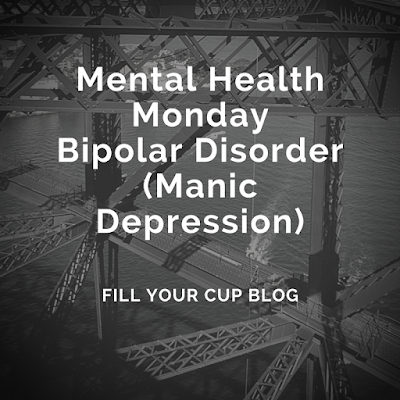Mental Health Monday: Bipolar Disorder
Hello friends! After a crazy three weeks of getting ready for college, getting settled into college, and starting my very first college classes, I’m back and ready to blog! And for those of you who don’t know, I’m a freshman at the University of North Texas, and I’m majoring in Psychology.
Now, back to the blogging.
As you know, it’s Monday, and that means another Mental Health Monday.
Today’s focus is Bipolar Disorder.
Bipolar Disorder, also known as manic depression, is a brain disorder associated with unusual mood swings that make daily life and daily tasks difficult.
SYMPTOMS
Manic Episodes
The symptoms for bipolar disorder manic episodes include:
- Feel very “up” or elated
- Have a lot of energy
- Have increased activity levels
- Feel “jumpy”
- Have trouble sleeping
- Become more active than usual
- Talk really fast about a lot of different subjects
- Be agitated or irritable
- Feel like their thoughts are going very fast
- Think they can do a lot of things at once
- Do risky tasks (ex. Spending a lot of money)
Depressive Episodes
The symptoms for bipolar disorder depressive episodes include:
- Feel very sad, down, empty, or hopeless
- Have very little energy
- Have decreased activity levels
- Have trouble sleeping (this is a symptom of both manic and depressive episodes)
- Feel like they can’t enjoy anything
- Feel worried
- Have trouble concentrating or forgetting things often
- Eat too much or too little
- Feel tired or “slowed down”
- Think about death or suicide
TREATMENT
Bipolar disorder cannot be fully treated, but it can be managed with medications or types of therapy.
MEDICATIONS
Medications for bipolar disorder include:
- Mood stabilizers
- Atypical antipsychotics
- Antidepressants
Sleeping medications may also be prescribed in addition to one or more of these medications.
OTHER TREATMENTS
Other treatments for bipolar disorder include psychotherapy (also known as talk therapy).
These include cognitive behavioral therapy (CBT), family-focused therapy, interpersonal and social rhythm therapy, and psychoeducation.
A NOTE FROM ME
As always, if you’re experiencing any of these symptoms or anything else you believe might be connected with bipolar disorder, talk to your parents or a doctor. I promise that there are people out there who are there for you and want to help you with anything you’re dealing with, including me. Feel free to email me at happyhannahlauren@gmail.com if you have any questions or anything you would like to share.
Have a lovely day, and don’t forget to fill your cup.
Love, Hannah

Comments
Post a Comment